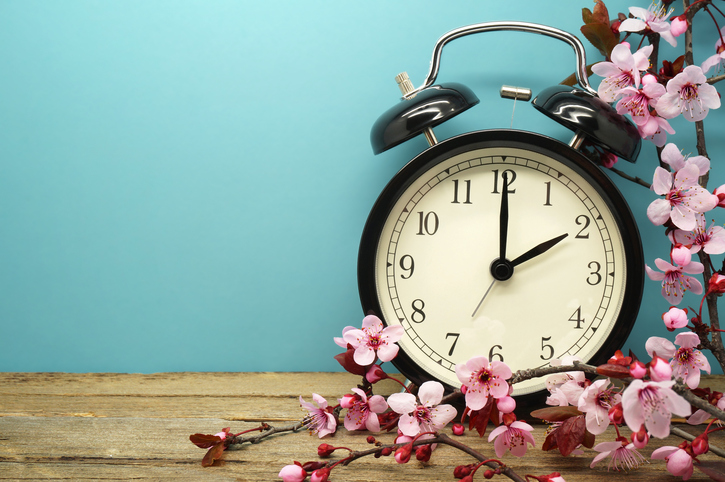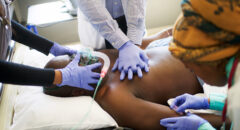 Believe it or not, daylight saving time - when we "spring forward" and set our clocks one hour ahead - may be harmful to your health. While you may not have felt the slight time change immediately, the shift can significantly impact your well-being, experts say.
Believe it or not, daylight saving time - when we "spring forward" and set our clocks one hour ahead - may be harmful to your health. While you may not have felt the slight time change immediately, the shift can significantly impact your well-being, experts say.
In fact, over time, the switch can become difficult, leaving you feeling groggy, as well as impacting your motor skills, appetite and heart.
How daylight saving time affects your health
A 2016 study found that the overall rate for stroke jumped 8 percent in the two days following daylight saving time, with cancer patients and people aged 65 and older, 25 percent and 20 percent more likely to suffer a heart ailment, respectively.
“Previous studies have shown that disruptions in a person’s circadian rhythm, also called an internal body clock, increase the risk of ischemic stroke, so we wanted to find out if daylight saving time was putting people at risk,” says study author Jori Ruuskanen, MD, PhD, of the University of Turku in Turku, Finland.
Another study indicates that the number of heart attacks was about 21 percent lower than usual for the week following the conclusion of daylight saving time than all the other weeks of the year.
According to a U.S. study conducted in 2014, heart attacks may be linked to disrupted sleep cycles -- which could explain the decreased risk of heart attack and stroke after the clocks turn back, as individuals find more time to kick up their feet and rest, the study’s author Amneet Sandhu, a cardiology fellow at the University of Colorado in Denver, told Reuters.
"With daylight saving time, all of this is compounded by one less hour of sleep," says Sandhu, who presented his findings at the annual scientific sessions of the American College of Cardiology in Washington.
"Our study suggests that sudden, even small changes in sleep could have detrimental effects," he adds.
In addition to heart health, your motor skills may take a big hit. During a 2009 study, researchers examined over 500,000 mining injuries from 1983 to 2006. Per their findings, injuries spiked by 5.7 percent on the Monday following the time change. The injuries also appeared to be more severe, leading to a 68 percent increase in the number of workdays missed.
You may also see several AAA trucks making their rounds as research has noted a surge in car crashes as well, following daylight saving. In a study published in the American Economic Journal, Austin Smith, an economics professor at Miami University's Farmer School of Business in Miami, Ohio explains, "Many Americans are sleep deprived and when starting with chronically low levels of sleep, even a small reduction can have serious consequences.” There's a reported 6 percent rise in crashes after clocks reset.
RELATED: Missing That Lost Hour? Tips To Sleep Better After Daylight Saving Time
Tips for easing into the time change
Adjusting to the time change can be difficult. Younger, healthier people may adjust more quickly, Girardin Jean-Louis, director of the Center on Translational Sleep and Circadian Sciences at the University of Miami Miller School of Medicine in Florida says. But for older people, or those with medical conditions that affect their sleep, "it's a much, much harder task to try to get back to schedule."
Dr. Beth Malow, director of the sleep division at Vanderbilt University Medical Center in Nashville, Tennessee and Jean-Louis offer the following tips to make the transition a little easier:
- Take sleep seriously. Most adults need at least seven hours a night, the Centers for Disease Control and Prevention says. Older and younger people may need more. Yet a third of U.S. adults are sleep-deprived, CDC data show. The shift to daylight saving time can exacerbate that, Malow says.
- See the light. Jean-Louis also emphasizes light exposure in the morning. "You could wake up one hour early and take a walk facing east so that you have exposure to the sun as it rises."
- Coffee? OK, but be careful. Malow and Jean-Louis are coffee drinkers. And both say it's great for keeping you alert in the morning. But only drink it early in the day. "If you're having coffee at about 3, 4 or 5 p.m., that's just not good," Jean-Louis notes, "because it can trigger a cascade of dysregulated sleep cycles, which influence your ability to get a good night's sleep."
- Don't use alcohol to help you fall asleep earlier. "That can actually interrupt your sleep in the middle of the night," Malow shares.
- Limit screens. The blue light from screens is "kind of like being exposed to sunlight late at night," Malow adds. So limit time looking at them, especially at bedtime. "Try reading a book or do something that doesn't involve that light. If you absolutely have to be on your computer or phone, use settings that help cut down on the light."
- Help the kids. Parents of small children know that time changes can be rough. But most of the advice for adults also works for kids, Malow shares. "Try to get them to bed a little earlier..." she says. And "pay attention to getting them out in the bright light as much as you can once we make the change so they can acclimate."
- Address persistent problems. If someone has a regular problem falling or staying asleep, or if they have signs of sleep apnea such as snoring or excessive sleepiness, "they really should get it checked out" by a doctor, Malow says. Sleep is important not only for feeling good, "but it can make a tremendous difference on our health, including our heart health."








